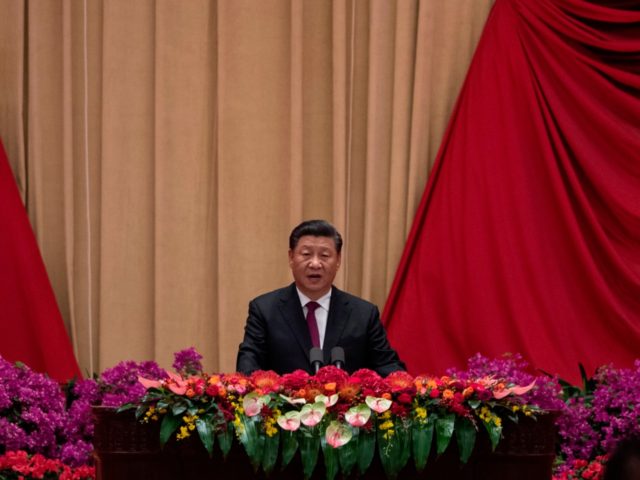Chinese Communist Party leader Xi Jinping called “the complete reunification of the motherland” – by which he meant the annexation of Taiwan and solidification of control over Hong Kong and Macau – “inevitable” and vowed to “unite all Chinese sons and daughters” on Tuesday.
Xi spoke at China’s largest ever military parade, featuring 100,000 performers, to observe the 70th anniversary of the re-founding of China as a communist state. While Xi spoke in Beijing, thousands took the streets in Hong Kong for a “day of mourning” in observance of the victims of communism – 45 million under Mao Zedong alone – and most in Taiwan shrugged at the idea that they had a place in the festivities.
Taiwan is a sovereign nation and was established as the Republic of China following Mao’s ascent to the leadership of China. It has never been under communist rule by Beijing.
Xi’s dictatorship views Taiwan as a rogue province and refuses and diplomatic ties to states that accept the reality of Taiwan’s sovereignty. The United States does not acknowledge Taiwan as a state to maintain ties to the Communist Party.
Xi insisted in his speech Tuesday that the era where Taiwan asserts itself as a fully functional state will soon come to an end.
“We must uphold the principles of ‘Peaceful Reunification’ and ‘One Country, Two Systems,’ maintain lasting prosperity and stability in Hong Kong and Macao, promote the peaceful development of cross-Strait relations, unite all Chinese sons and daughters, and continue to strive for the motherland’s complete reunification,” Xi said.
“One Country, Two Systems” is the name of the failed policy currently in place in Hong Kong, which Beijing has attempted unsuccessfully to coerce Taiwan into accepting.
“Today, a socialist China is standing the midst of the world and there is no force that can shake the foundation of this great nation,” he said. He called “reunification” with Taiwan “inevitable.” Xi refers to the annexation of Taiwan as “reunification” even though the Communist Party has never ruled Taiwan.
Xi claimed that “Chinese people of all ethnic groups and all the sons and daughters of the Chinese nation at home and abroad take pride in and give our best wishes to our great motherland with great joy,” despite the people of Hong Kong mourning the day in public. He also described pre-communist China as “more than 100 years of humiliation and misery.”
Taiwanese people largely accept their sovereign status and have no interest in entering communist rule for the first time, the Taipei Times reported on Tuesday.
“I think it is natural that we see ourselves as Taiwanese, we were not born in China after all,” college student Stephanie Fu told the newspaper and Agence France-Presse (AFP). “There’s no sense of belonging to China. Culturally we may be Chinese and similar, but there are still differences.”
In the same piece, another high school student identified as Doris Cheng recoiled at the idea of Taiwan being a part of China, insisting, “Taiwan has autonomy, a government, our own people and territory.”
Researcher Wu Jieh-min told the Liberty Times that Xi Jinping’s belligerence is pushing away even Taiwanese people more likely to consider annexation.
“Beijing itself has unintentionally been the impetus for this change and fostered the birth of a generation of people who consider themselves to be ‘naturally independent’ from China,” Wu said. “The situation today is one of convergence between Taiwanese-independence advocates and those advocating the independence of the Republic of China. The bottom line is an absolute opposition to Taiwan falling into the hands of the totalitarian CCP.”
“The more Xi pushes his ‘One Country, Two Systems’ offensive, the more the majority of Taiwanese will express to Xi: ‘I don’t want to be part of the same country as you,'” Wu said.
“One Country, Two Systems” should, on paper, allow the autonomous regions of Hong Kong and Macau the ability to govern themselves as capitalist, without intervention from Beijing. That illusion came crashing down in June when the Beijing-controlled Hong Kong government attempted to impose a law that would allow China to extradite anyone present in Hong Kong if accused of violating communist laws, essentially activating communist law in the city. Hong Kong entered its 17th week of protests since then this week, culminating in today’s “day of mourning” against communism.
Police used tear gas, rubber bullets, and live fire against protesters on Tuesday, shooting a schoolboy in the chest and leaving him in critical condition, according to local broadcaster RTHK. He was taken to the hospital conscious but may become the first fatality of the Hong Kong protests. The shooting was the third recorded time that police have used live bullets on unarmed protesters since the movement began in June.
“There is no National Day celebration, only a national tragedy,” protesters reportedly chanted in Hong Kong, demanding freedom for political prisoners and an end to police brutality.
Hong Kong canceled its annual National Day fireworks to prevent protesters from using it as a venue to defend freedom.
Follow Frances Martel on Facebook and Twitter.

COMMENTS
Please let us know if you're having issues with commenting.